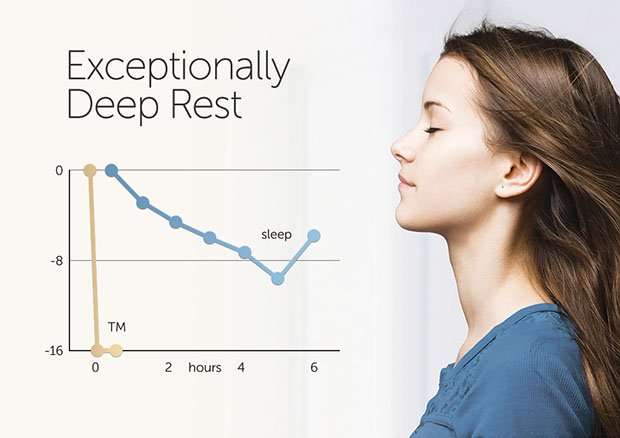With the expanding belly comes expanding responsibility.
Here’s how the meditating can help both the expectant mom and the baby soon to be born!
1. It relieves stress
Studies show that stress during pregnancy increases the risk of miscarriage and premature delivery — and might even contribute to longer labor. When the expectant mom suffers from stress, the baby has a higher chance of having low birth weight and problems with cognitive and emotional development.
Research has repeatedly demonstrated that the TM meditation technique effectively relieves stress. If the person practicing it twice a day for 20 minutes happens to be pregnant, the benefits are multiplied by two.
2. It helps ensure a good night’s sleep
Evidence is mounting that poor sleep during pregnancy can lead to adverse outcomes such as preterm birth, prenatal depression, gestational diabetes, preeclampsia, abnormal length of labor, caesarean delivery risk, and problems with the baby’s growth. [i]
Studies show that meditation practice helps to beat insomnia. By providing the necessary relaxation and stress relief, it can help the two-in-one sleep peacefully through the night. [ii]
3. It protects against high blood pressure
High blood pressure during pregnancy is not good news. Firstly, it can lead to decreased blood flow to the placenta, leaving the baby without sufficient oxygen and nutrients.
Secondly, hypertension increases the risk of placental abruption and preeclampsia — conditions which can be life threatening for both the mom and the baby. Thirdly, elevated blood pressure raises the chance of premature delivery, which is risky for the health of the child.
Blood pressure medications taken while expecting may not be completely harmless for the little one growing in the womb, but the Transcendental Meditation technique has been proven to reduce blood pressure without harmful side-effects. [iii, iv]
While every medical condition must be handled under the careful supervision of a physician, a great stress relief technique will certainly contribute positively to the process of treating hypertension.
4. It helps keep cholesterol levels under control
High cholesterol levels are associated with difficulties getting pregnant. However, even after successful conception, elevated cholesterol levels increase the risk of complications such as pregnancy-induced elevated blood pressure, and pre-eclampsia. In addition, high cholesterol levels raise the probability of preterm birth or of giving birth to a baby too large for its gestational age. [v]

- ALL THE INFORMATION YOU NEED: See our infographic on pregnancy and stress, based on latest scientific research
Research shows that even when a person does not change his or her lifestyle or eating habits — which, of course, every expectant mother should also pay attention to and alter if needed — TM practice 20 minutes twice a day results in significantly lower cholesterol levels. [vi]
5. It can help manage labor pains
Research indicates that TM practice decreases the distress associated with the experience of acute pain — that is, physical pain is still there, yet the feeling of pain is not perceived as strongly by the mind. Even though experiments have so far been conducted in laboratory settings and not with women actually giving birth, it may be that meditators also have an easier time during labor. [vii, viii]
The Transcendental Meditation technique does not require any special position or gear — just sitting comfortably is enough to practice the technique. Thus any soon-(again)-to-be-mom can pick up TM as an effective shortcut to a healthy, happy pregnancy and delivery.
WATCH VIDEO: Dr. Suzanne Steinbaum, spokesperson for Go Red for Women endorses the practice of Transcendental Meditation:
References:
[i] “Chronic sleep loss during pregnancy as a determinant of stress: impact on pregnancy outcome.” http://www.ncbi.nlm.nih.gov/pubmed/24994566
[ii] Haratani T., et al. “Effects of Transcendental Meditation (TM) on the health behavior of industrial workers.” Japanese Journal of Public Health 37 (10 Suppl.): 729, 1990.
Ljunggren G. “Inflytandet av Transcendental Meditation pa neuroticism, medicinbruk och sömnproblem.” Läkartidningen 74(47) : 4212-4214, 1977.
Lovell-Smith H. D. “Transcendental Meditation — treating the patient as well as the disease.” The New Zealand Family Physician 9 : 62-65, April 1982.
Orme-Johnson D. W., et al. “Meditation in the treatment of chronic pain and insomnia.” In National Institutes of Health Technology Assessment Conference on Integration of Behavioral and Relaxation Approaches into the Treatment of Chronic Pain and Insomnia, Bethesda, Maryland: National Institutes of Health, 1995.
[iii] “High blood pressure and pregnancy: Know the facts.” htttp://www.mayoclinic.org/healthy-living/pregnancy-week-by-week/in-depth/pregnancy/art-20046098
[iv] https://meditationlifestyle.com/benefits/transcendental-meditation-and-blood-pressure/
[v] “Maternal lipid profile during early pregnancy and pregnancy complications and outcomes: the ABCD study.” National Institute of Health.
[vi] Cooper M. J., et al. “Transcendental Meditation in the management of hypercholesterolemia.” Journal of Human Stress 5(4) : 24-27, 1979.
Cooper M. J. and Aygen M. M. “Effect of Transcendental Meditation on serum cholesterol and blood pressure.” Harefuah, Journal of the Israel Medical Association 95(1) : 1-2, 1978.
[vii] http://www.ncbi.nlm.nih.gov/pmc/articles/PMC2170475/
http://www.ncbi.nlm.nih.gov/pubmed/7022535


















